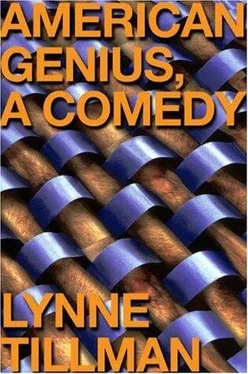Brod walks downstage and sits on the edge of the stage, while around me the dour man snorts, the Count squirms, Spike restlessly taps her foot, but I don't see the Turkish poet, though he must be here, exultant with these confabulations before us. My beloved father was a persecutor and a pleaser. One night he took me out to dinner, and, after he paid the bill, he looked sad, I asked him why, and he said it wasn't good enough, he'd wanted to take me for a very good meal, he was sorry it wasn't better, he repeated downcast, as if everything had depended upon this dinner, which I remember now, but don't know why.
Felice: I love my garden. I want to grow roses for you. Roses are ancient. They are Aphrodite's tears and Adonis's blood. I want you to be happy. I will sit beside you, nurse you. But each letter upsets me, each of your thoughts undoes the previous one. My mother grows increasingly upset, too. When will we marry, she asks. I am weary sometimes. I don't want to be a burden.
Kafka: "You know, there are wonderful sanitoria in this wide world."
The Narrator: Do not laugh at a blind man nor tease a dwarf nor injure the affairs of the lame, Kafka.
Kafka: I? Never. Aren't I afflicted, too?
Brod points his index finger at the narrator, scolding her, then she puts her script aside, and, with mirth, points her index fingers at the audience. Saint Rita harumphs loudly to the Frenchman beside her who courts and esteems evil and smiles with glee, then Rita's mouth screws shut in a universal sign of disgust, while next to the Frenchman, the Magician appears rapt. Where is Contesa sitting or hidden, I wonder, she's quoted the Count about the lame, from his "Dead Hand Notes" lecture. My skin seethes with vermiculations, which promiscuously derange my body, and now the Count encloses my warm hand inside his icy one, and I jump at the surprise.
The Narrator: To Kafka, a bourgeois marriage was a strangulation. According to his friends, he was humorous. He was full of fun, a barrel of laughs. But for him marriage wasn't funny, and he feared he'd become a fat bourgeois.
Kafka: (walking quickly from side to side onstage) There was a very religious man who never doubted God's existence. One day a flood came, and he went to the top of his house and sat on the roof. People passed by in a boat and offered to row him to safety. No, he said, I'm waiting for God to stop the flood and deliver me. A second boat came by, filled with people, and then a third. Each time the religious man said he was waiting for God's deliverance. Finally, his house collapsed, and he drowned. The man went to heaven where he beseeched God: Why did you fail me? God said: I sent three boats.
Kafka holds his sides and laughs demonically, Felice isn't laughing, standing at the edge of the stage, and will she jump off in a symbolic suicide? Just now she reminds me of my sleeping-pill-addicted friend, whose infuriated neediness could only be quieted with barbiturates, and maybe she enters because it was in a theater when I last spotted this former friend, but because she'd had plastic surgery and looked similar to herself at the age when we met, I couldn't tell if it was really her or someone who looked like her, but younger, and I didn't say hello, because it's often better not to say anything. The person I thought she was could have been her daughter, or it simply may not have been her, but whoever it was was crying.
Brod: She hoped that the mordant man, who abhorred violence, would be the right one for her. A good husband. He explained to her he couldn't be. But Felice was a slave to her love.
The Frenchman applauds inappropriately, I don't know precisely why, though he may cherish enslavement, and Saint Rita moves farther from him. Is there a way to avoid such metaphors? I can take apart a chair, even a beloved chair, because it can be taken apart and is only a chair, and slavery is also slavery. I'm tense, preparing for a decisive event, or wishing for it, because, without a complement of elements cresting conclusively, I may not feel satisfied, fulfilled, or able to rest. Where will things go? Where will these images and words go when we've left here? I like to place objects where they should be, in the right containers, to avoid mess and spills, and, at the end of the day, dirty dishes in the sink are sometimes maddening. Yet the trivial, broken, and incomplete are dearer to me, more precious, since what can't be spliced together, cleaned up, and unanimously credited propels novelty, as an antic irrelevance may also parent art and science. I want contentment and satisfaction, things falling into place, not apart, which is incongruent with my impulse to take apart and leave things in pieces on the floor. But, generally, I would prefer to be indifferent to every outcome.
Felice: I might soar if I were not stuck to the ground by his exceptions and rebukes. His strange writing! I am lost to it. I never see him, he never visits, he breaks our appointments. He writes me every day, twice a day. I should leave him. But his words are life to me now, and he loves me. He needs me.
The Narrator: Woman, beware your needs!
Brod: Ach, ach…
Kafka: "The first evening we met… what a lot has happened between that evening and now, and since to blush is to admit, your blushes on that occasion. implied the following: `Yes, he loves me, but for me it is a great misfortune. For he thinks that because he loves me, he is free to torment me… He always talks in riddles.' Dearest Speaker: I would give my life for you, but I cannot give up tormenting you."
Felice's and Kafka's torment is that his love is a torment, so agitated when I'm supposed to be calm, I turn from the picture onstage to the picture window that frames the dark forest beyond the Rotunda Room, whose jumpy spirits may be quivering, fornicating with abandon, or sleeping, though they don't need to rest. Beyond the window lies the beauty of the world, I tell myself, not believing in spirits or the world's beauty, yet the ideas aid me, pull me off Kafka's words, and soothe me like a subtle emollient on the skin or a lovely description of a facial, and I wantonly reckon the possibility of there existing a magic that has the power to console, and, if so, how it might trick me, if it hasn't already.
Some believe cats are magical creatures, I don't, but I have a limited idea of magic, I like illusion, and don't need to believe it, but cats have the power to console. An affectionate cat lying on your chest, as it purrs, is a consolation for the horrors of the world, though its being in no way alters the plight of the world, apart from fostering your sense of well-being in a reclusive, evanescent moment. A cat can sense when you're unhappy, even my wild cat once lay on my back when I cried, he didn't lie on it for long, but since it was the only time he did, and I was crying, I believe he knew I was unhappy and he was trying to help me. He may be purring now, keeping my mother company, if her old cat permits, as she and her brain age, I know of a dog who lies on the beds of dying people in hospitals, he always knows when a person will die, he senses death coming, and he's always right, or my cat could be in a corner, lonely for me, which I doubt, but in some way I'd like him to miss me though not be miserable. Actually, I want to be surrounded by many cats, hundreds, if I didn't have to take care of them all the time and be responsible for cleaning their litter boxes, because when looking at them, at their sleek coats, their serene indifference, their implacable calm, unless they've gone mad like my cat who stalked and attacked me, the world's horror leaves temporarily.
The disconsolate woman and tall balding man come to the center of the stage, hold hands, and stare into each other's eyes. They embrace and slide back and forth across the stage, wordlessly, and, with each movement, Kafka tightens his grip, so her anorectic body disappears inside his embrace, she is affixed to his body like a stamp, then he pushes her away from him, and this happens again and again. At last, Felice shakes her head and disengages, wrests her painfully thin person from him, while she covers her face with her hands and then, in or out of character, weeps softly.
Читать дальше












